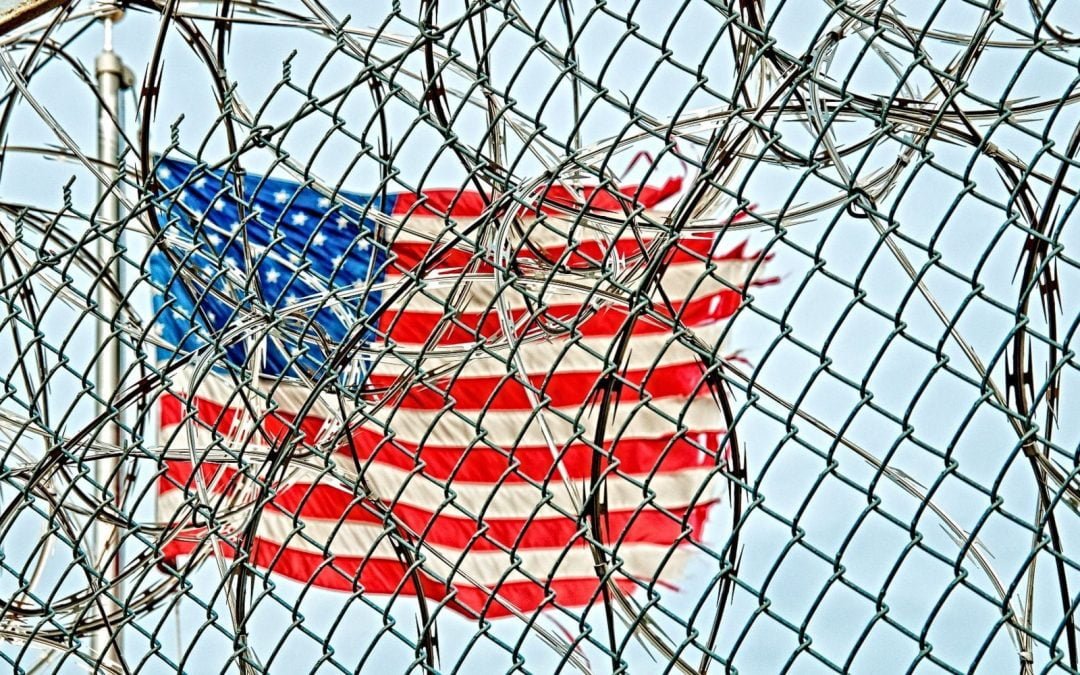Weary from the seven-hour drive from Greensboro, North Carolina, to Lumpkin, Georgia, our 10-member Temple Emanuel contingency shuffles past a barbed-wire fence and into the confines of the Stewart Immigrant Detention Center, which houses nearly 2,000 men.
I worry I’m going to see egregious human rights violations that will change my world forever, and not in a good way.
But I remember why we’ve come. Judaism teaches that, “When you save one person, it’s as if you have saved the world.” As a teacher and a tutor, I’ve been working toward doing that my entire adult life.
Amid heavy plastic windows and landline phones, our group stands in a registration line to visit the five detainees, also from Greensboro, who have requested our presence.
The waiting room is cloaked in silence; it eerily resembles a DMV, with two attendants – guards – and a room full of chairs.
The majority of those waiting in chairs are young mothers rocking their young children.
A guard offers a 3-year-old boy a piece of candy, but he’s too busy slipping off his tiny boots and placing them on a conveyer belt before walking through a security detector that will allow him and his mom a one-hour visit with his father.
We’ve been briefed by El Refugio Ministry, the organization hosting our group, that we will wait three hours before our visit, the same as all of the families in the waiting room.
According to El Refugio, families travel up to seven hours every weekend for their one-hour visit with their fathers, uncles, brothers or husbands. All of their conversations are taped by the detention center.
We learn that the center’s civil court is located in the same facility. Because this is the largest privately owned detention center east of the Mississippi, overwhelmed lawyers tele-connect directly to the court without ever meeting their clients in person.
Thus, this immigration court has the highest denial-of-asylum rate in the country – 87% compared to the average of 45%.
Three hours later, our names are called. Two members of our group visit a detainee who was stopped by police and detained by ICE for driving with an expired license.
He has had blood in his urine for more than three weeks, but the detention center has canceled four doctor’s appointments and refuses to give this man any medication.
The man that my partner and I visit is a sociology teacher from a war-torn country; his three young children scattered throughout his homeland, he traveled through 15 countries to reach the U.S. border.
There, ICE took him into custody and transferred him thousands of miles away to this center – one of 14 immigrant detention centers privately owned by Corporation of America/Core Civic.
CAC is a government contractor tasked with filling 33,400 beds at $124 per person per day, resulting in a financial motivation to “catch” more asylum-seekers.
But the saddest moment is when we witness a young mother nurse her 1-year-old baby as the father gazes at them from behind the plastic window.
The baby turns to look at his dad, then sobs while beating his tiny fists against the window. The father can only look on helplessly.
While we wait for Congress to take action and pass comprehensive immigration reform, not a wall, we as community members must contact our state representatives and senators, leave a voicemail and demand that the U.S. government treat detainees as human beings – not wild animals.
This treatment cuts across party lines.
President Obama deported more people than any president since President William McKinley in 1900.
But under President Donald Trump, negotiations between defense and prosecuting attorneys are prohibited, and babies and children remain in detention.
Immigrants fleeing war, gangs, violence and rape don’t have the luxury of waiting 10 years following applications to become U.S. citizens.
Instead of sending thousands of asylum-seekers “back to Mexico” into dangerous territories foreign to most of those fleeing, we should consider our ability to accommodate those yearning for refuge and asylum.
The Pentateuch remarks 36 times that we are exhorted to “treat thy neighbor as you, yourself, would like to be treated, for once you were a stranger in a strange land.”
Beside Native Americans and indigenous peoples, we were all strangers in a strange land in our histories.
This holiday season, I encourage you to consider this challenge: Befriend those of a different color, religion or economic status from your own. Refuse to blindly follow politicians on their path of mistrust and hate.
Love one another. Let reason and compassion guide your heart and your tongue.
And think about the 1-year-old beating on a window, inhumanely separated from his father – your neighbor.
Jennie Spallone is a lifelong advocate, educator and social action activist in Greensboro, North Carolina, and is a member of Temple Emanuel in Greensboro.

